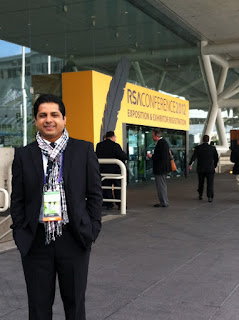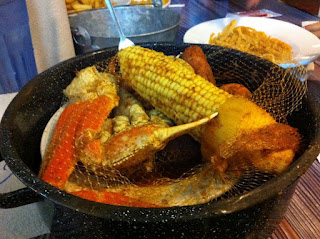When I reached the San Francisco International Airport (SFO) on 27 February after an 18 hour-long journey, I was struck by its relative simplicity—no in your-face opulence, no plush carpeting and lush greenery, no colourful paintings, advertisements or messages on the wall. It was bare, minimal, and utilitarian. Even though there were some murals on the wall that showed the history of the airport (the airport was built in 1927), they seemed unobtrusive. Clearly, this airport was not jostling for any international awards like Seoul, Singapore and Hong Kong airports did. It exuded the equipoise and quiet simplicity of a veteran compared to a parvenu’s over-eagerness to please and score points. How else could I explain it?
But the airport’s snaking queues at the immigration area did remind me of the scenes at Shanghai and Sydney airports. It was a stark contrast to Singapore where I have rarely seen a crowd of travelers thronging the immigration area. Quite noticeable was a group of young Chinese students who were chatting noisily. Besides the Chinese, there were many Indians too in the queue—both young and old—young IT engineers and parents visiting their children who worked in the U.S.
I cleared immigration in nearly 40 minutes (most of it was spent waiting in the queue), and thankfully, there was no interrogation with the department of homeland security officers.
While waiting for my turn in the queue, I was watching the welcome videos being played on TV monitors in the immigration area. In one video, an ethnically diverse America was on display and each representative of a race said ‘welcome’ to visitors in their own language. An Indian character said Swagatam, that is welcome, in Hindi. It was so pleasing. I immediately felt at home.
When I came out of the airport after collecting my bags, I was hit by the rushing cold gusts. Even though the weather was clear and the day was partly sunny, there was a biting cold in the air and throughout my stay in San Francisco, that chill was to remain my constant companion. I felt as if someone was rubbing ice on my face all the time.
I had to wait for nearly ten minutes to get a taxi—there were no taxis waiting for tourists. This was another contrasting feature because in most Asian cities, we hardly have to wait for cabs. It is the other way around.
“Where do you want to go, brother?” the cabbie asked me. I told him the address while he helped me with the luggage. The cab driver seemed to be a Muslim from an African country. I could see an Arabic newspaper peeping out of a compartment in his dashboard. We hardly spoke with each other during the journey. It took nearly forty minutes to reach my hotel which was in the financial district of the city, very near to the Union Square.
What was interesting about the journey from the airport to the hotel was the view of the city from the taxi’s window. There was the San Francisco Bay on one side and low-rise houses and buildings on the other side, laid out over ridges and slopes of a hilly topography. It was lunch time but the traffic was not mad. The first thought that came to me was that of the expanse and the breadth of the city—dotted with individual houses and not many tall skyscrapers trying to kiss the skies. This led to the second thought that this place definitely couldn’t be as stressful as many big Asian cities where people and high-rises are crammed in small areas like pieces on a puzzle board.
Naturally, I was curious to explore the city as much as I could. Since I was in San Francisco for a conference, sightseeing was possible only when I had free time on hand.
Even though I was staying in a pricey boutique hotel, it lacked facilities that are usually considered normal in Asian hotels. Like coffee in the room. There was a mini bar but there were no electric kettles to help you make tea or coffee. One had to go down to a waiting area near the hotel’s reception at 5 am to get one’s morning tea or coffee. But once there, if you had sipped the coffee, your complaints would vanish. The coffee was good (no cookies though to go with the drink) and I quite liked the half and half milk instead of the skimmed version or the Soya milk to prepare my cuppa.
Outside the hotel on Geary Street, there were many coffee shops, including a Starbucks. I couldn’t get to try one. Only once did I buy a cup of coffee on the go from a sidewalk coffee stall. I think it was called Pete’s Coffee. It wasn’t bad.
The hotel had a good heating system, and once I was in the room, the cold was totally out. I could sleep in a shirt in my room. That was a pleasure. While in the room, I mostly read newspapers or scanned through the travel guides that I had packed. Cable TV was crappy—most channels broadcasted inane shows (comedy, sports, teles-hopping) and for news there were only some local channels on offer. I seemed cut off from the outside world.
Instead, newspapers kept me good company. I could get free copies of The New York Times, The San Francisco Chronicle, The Wall Street Journal and The USA Today in my hotel. Some of my friends were staying at the Sir Francis Drake Hotel and there I could get hold of copies of The San Francisco Examiner. The newspapers were not delivered to my room. I had to go down and pick them up from the reception area.
Panhandlers everywhere
If I stood in front of a hotel or a Walgreens pharmacy store, panhandlers would come and ask me for a cigarette or a dollar. Some homeless people pitched me their association’s newspaper instead of directly panhadling. Street Sheet of the Coalition on Homelessness went for a suggested minimum donation of one dollar. I bought the January issue which was a poetry special. Most of the poems in the newspaper spoke of the problem of homelessness in the city. According to Wikipedia, San Francisco, due to its mild climate and its social programs that have provided cash payments for homeless individuals, is often considered the homelessness capital of the United States, together with Los Angeles. The city’s homeless population has been estimated at 7,000-10,000 people, of which approximately 3,000-5,000 refuse shelter. The city spends US$200 million a year on homelessness related programs.
While scanning the local newspapers, two items that caught my eye were the shutting down of airline services in smaller towns in the country. Airline capacity is decreasing in America (went down by 6 percent last year), as airlines are downsizing or completely cutting off their services on loss-making routes (United Airlines dominates the US airlines business but there are some small players in the market too). I see similar problems in India as private airlines are fighting for survival.
The other item was not actually a problem. The day I had arrived in San Fran, the Academy Awards took place but I witnessed no Oscar mania in the American national or local media—at least not like the one I have seen in India and Singapore. For example, I didn’t see the Oscar coverage on the front pages of newspapers. The NYT carried a story that said that the TV ratings of the Academy Awards’ annual show were going down. There were also reports that bashed the performance of this year’s show host Billy Crystal; Sacha Baron Cohen’s dictator prank and J Lo’s wardrobe malfunction created some stir in the media.
Since my hotel was in the theatre district, I passed by many theatres and art galleries on my way to the conference venue at the Moscone Centre (one play was on, and another play with Jonathan Price was to start in late March). Adjacent to the Moscone centre is the Yerba Buena Centre where iPad 3 is scheduled to be launched on March 7. Close to these two centres is the SFMOMA. It is a famous museum but I could not get a chance to visit it.
We are so used to seeing Seven Eleven stores here but over there I could spot only one where I stayed. I saw more branches of the pharmacy Walgreens than those of Seven Elevens. And Walgreens sells you many things—from medicines to cosmetics to clothes and food items. Some of the stores are open until midnight and some are open 24 hours a day.
They city has many tobacconists too who sell tobacco products and alcoholic beverages. Beware that prices of items vary from shop to shop.
Since I was staying near the Union Square area, which is also the shopping district, I could visit many shopping centres such as Macy’s, Saks at 5th Avenue and Neiman Marcus. Nordstrom in the Westfield Shopping Centre is spread over several floors but I could not find a toy section there.
During my stay in San Francisco, I used taxis, buses, trains and cable cars. Taxis are not as cheap as in Singapore. Cable cars are fun but they come for $6 per ride. Bus rides are interesting because a two dollar ticket can afford you many rides during a given 3-4 hours time frame.
Among the city’s famous tourist spots, I could only visit the Fisherman’s Wharf and the Golden Gate Bridge, both at unearthly hours. I had a delicious crab, the spiciest one available in the restaurant, at around midnight. Outside, it was very cold and most of the outlets were closed. There were hardly any tourists there at that time and I could hear the seagulls and the sea lions in the semidarkness of the cold night.
Reading the city guides I had thought that the wharf and the Golden Gate Bridge were close by. They are not. I had to take two buses to reach the bridge early in the morning. It was a great view, even though it was drizzling and gusts of chilly winds were blowing, making it difficult for me to walk on the bridge. Because of inclement weather, I abandoned the plan to walk across the length of the bridge.
On the last day, I took the Bart train to the Silicon Valley to meet a friend (from Powell Station to Freemont). It took me about one hour, the train ride was comfortable, and I had to buy a ticket of only $5.60. It would have cost me around $100 if I had taken a cab. I spent a few hours with my friend and his family and finally got a taste of the American suburbia.
The saddest part of the trip, as I recall now, was the sight of panhandlers and the homeless braving the cold at night, sleeping on pavements with their dogs and cats. It was painful to see people looking for food in the trash bins in a rich city like San Francisco.
By the time I returned to the airport to embark on my return journey (2 March), I was already longing for the sun and warmth in Singapore.









